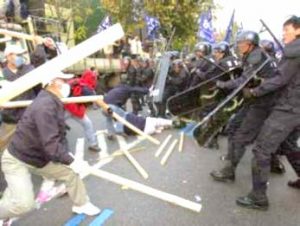
Workers in South Korea have a long history of militant class struggle. In the picture above, autoworkers wield clubs against riot police during a 2003 anti-government rally in downtown Seoul.
Spoiler Alert! The 2019 Academy Award winning film Parasite is being hailed as an explicitly class conscious film. But the poor family it depicts as “class conscious” is far from understanding that the capitalists are their enemy, much less from seeing the need to unite with other workers to organize against them and fight for a better system, which at this time in history means fighting for communism.
But director Bong Joon-ho and screenwriter Han Jin-won are liberals, not communists. They created an edgy social critique on class division in Seoul, South Korea about two families; the poor/working class Kims and the wealthy Parks.
The “class conscious” Kims they created try to get out of their poverty not by organizing to overthrow their capitalist oppressors, but by getting hired by them. They, like the capitalists, have no scruples about how they achieve their goals. They scheme to get the workers, whose position they want, fired. Instead of uniting, these oppressed workers end up hopelessly fighting each other to the death.
The movie begins showing the Kims living in a densely populated poor neighborhood in a small basement apartment that is prone to flooding. In contrast, the Parks live in a wealthy suburb with perfectly manicured lawns. Trying to manage the struggles of his family existence, Ki-woo is advised by his friend to take a position as an English tutor to assist the Parks’ daughter Da-hye. The charades begin when Ki-woo decides to pose as a college student to get the position. Mrs. Parks decides to call Ki-woo “Kevin.” With the success of Ki-woo’s facade, Ki-woo is informed by the Parks’ matriarch, Mrs. Parks, that she needs an art therapist for her young son. Ki-woo informs his sister, Ki-jeong. Posing as “Jessica,” with no formal training in art, Ki-jeong is hired as well. Ultimately the entire Kim family (matriarch is hired as a housekeeper and the patriarch is hired as a chauffeur).
Arguably the most interesting story line of the film is when the Kims’ successfully get the original housekeeper, Moon-gwang, fired to hire the Kims’ matriarch. From that point the story takes a turn for the worst when the Parks decide to go on a family camping trip. Subsequently, Moon-gwang returns and pleads with the Kims to let her in. Upon entering the home, Moon-gwang opens a hidden passage to a basement, where her husband Geun-sae has secretly lived to escape capitalist (capitalism) loan sharks. Moon-gwang begs the Kims to continue to assist her husband, but Chung-sook (Kim matriarch) refuses.
Obviously, the Kims aren’t willing to help Moon-gwang and Geun-sae because they feel that they have to keep up the charade to protect their economic interest. In the end, the story becomes both tragic and violent. Readers should watch the film to make their own observations.
The most important point of the film is to highlight a serious problem with capitalism; selfishness. Self preservation is a main feature of capitalism because elites are fully aware that they are outnumbered. Increasingly, workers are aware that inequality or “the gap” between the rich and poor is widening. Therefore, elites like Donald Trump stoke the flames of racial and gender division. This serves the elites agenda, which is to divide and conquer. As long as we are divided we are more likely to blame our fellow workers for our economic oppression, instead of elites.
Well, we say NO MORE!!! It is time that we rally working people of the world to fight for communism! Under communism, there will be no Parks or Donald Trumps because we will all share in the labor to create and maintain a more equitable society. Stop letting elites fool you into hating your fellow worker and join us to finally put an end to capitalism.

